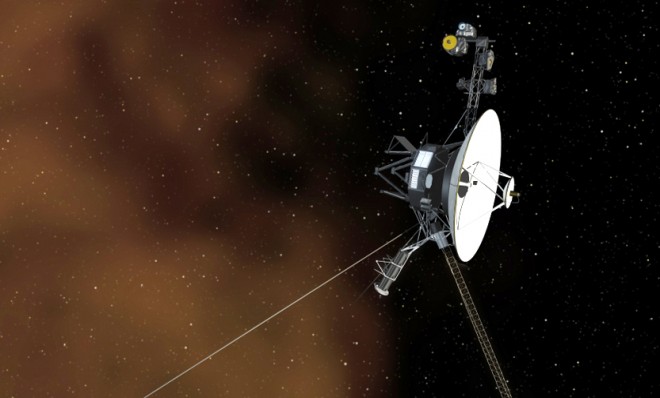The eight-track carrying spacecraft that just busted out of the solar system
Voyager 1 has become the first human-made object to reach interstellar space


A free daily email with the biggest news stories of the day – and the best features from TheWeek.com
You are now subscribed
Your newsletter sign-up was successful
If the universe feels a little smaller today, it might be because NASA confirmed that Voyager 1 has become the first human-made object to leave the solar system and enter the vast, unexplored area known as interstellar space.
It's a feat few could have imagined when the tiny probe began its journey in 1977, when the kids back on Earth were wearing bell-bottoms and Star Wars first hit theaters.
"I don't know if it's in the same league as landing on the moon, but it's right up there — Star Trek stuff, for sure," says Donald A. Gurnett, a University of Iowa physics professor and co-author of a paper published Thursday in the journal Science about the news. "I mean, consider the distance. It's hard even for scientists to comprehend."
The Week
Escape your echo chamber. Get the facts behind the news, plus analysis from multiple perspectives.

Sign up for The Week's Free Newsletters
From our morning news briefing to a weekly Good News Newsletter, get the best of The Week delivered directly to your inbox.
From our morning news briefing to a weekly Good News Newsletter, get the best of The Week delivered directly to your inbox.
Here, a look at some of the numbers that illustrate how far Voyager 1 has gone:
11.7 billion
Miles Voyager 1 has traveled since it set off on what was supposed to be a mere four-year mission to fly by Jupiter and Saturn. It then swung around the ringed planet, using it like a slingshot to power itself past Pluto. "It's still taking data and telling us what it's actually like out there," says Marc Swisdak, a University of Maryland research scientist who has worked with Voyager data but was not involved in the new study.
9.5 billion
A free daily email with the biggest news stories of the day – and the best features from TheWeek.com
Miles the spacecraft's twin, Voyager 2, has traveled since it departed 16 days after Voyager 1. Voyager 2 also checked out Jupiter and Saturn, then flew past the two gaseous planets Uranus and Neptune.
36
Years the Voyager probes have been in space.
1
Vintage eight-track tape recording system the Voyager 1 has aboard, to collect data. The probe, which is about the size of a subcompact car, has a device that converts vibrations of excited plasma particles into audible sound, and also carries instruments to examine magnetic fields, cosmic rays, and solar wind.
240,000
Number of Voyagers it would take to match the computer memory on a low-end iPhone.
38,000
Speed, in miles per hour, at which Voyager 1 is continuing to push farther from home.
3
Years it will take Voyager 2 to join its sibling in interstellar space.
12
Years the Voyager crafts have left before they run out of nuclear fuel, according to engineers, at which point scientists will have to power down their instruments.
23
Watts Voyager 1's transmitter uses to send data back to Earth.
17
Hours it takes for Voyager's signals to reach NASA's Jet Propulsion Laboratory in Pasadena, Calif.
30,000
Years it would take Voyager 1 to leave what some scientists consider to be the true edge of the solar system, beyond distant comets that orbit the sun.
Sources: CNN, Los Angeles Times, NASA, New York Times, Washington Post
Harold Maass is a contributing editor at The Week. He has been writing for The Week since the 2001 debut of the U.S. print edition and served as editor of TheWeek.com when it launched in 2008. Harold started his career as a newspaper reporter in South Florida and Haiti. He has previously worked for a variety of news outlets, including The Miami Herald, ABC News and Fox News, and for several years wrote a daily roundup of financial news for The Week and Yahoo Finance.
